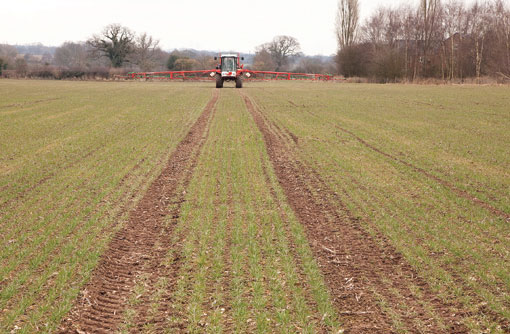Soil and Water Management Centre set to increase farmers’ knowledge

Developed in response to a report on the status of soil and water management in England by RASE and a number of independent bodies, the Soil and Water Management Centre aims to provide “sustainable improvements” in farming and ecosystem efficiency through better knowledge co-ordination, transfer and development.
“It’s becoming increasingly evident that research needs to be done to address the challenge of climate change, and that there’s a requirement for ongoing research into new and existing management techniques,” explained Harper Adams vice-principle and committee member Peter Mills.
The role of the centre, the hub of which is at the university, will be to co-ordinate national soil and water improvement resources, to transfer existing knowledge and develop ongoing improvement research.
Support from GrowHow, Challenger, Vaderstad, Agrii, Basis, Michelin and the Cooperative Farms for the next three years will give farmers the opportunity to benefit from knowledge transfer training and research from not just Harper Adams, but nationwide satellite research centres.
“The problem is that a lot of the pivotal research on soil took place in the last century,” said Prof Mills. “And as the environment and farming evolves to meet new challenges, new and ongoing research will be vital for farmers.”
The need to enthuse new soil and water scientists into the industry is also important, warned Dick Godwin. “We need to encourage a new generation of experts and farmers into soil research.”
“Soil is our most important asset. Modern rotations and machinery, not to mention the effects of climate change, are putting it under more pressure than ever before. We need to manage both soil and water much more effectively than we have been doing.
“To do this we need more home-grown soil and water management expertise. We cannot rely on overseas research as it simply not applicable in the UK. That is why it is so important that we do it ourselves.”
One research project which has already received industry backing is looking at improving soil sustainability and crop yields with controlled and low pressure traffic systems.” The work, undertaken by Prof Godwin and fellow researcher Paula Misiewicz, will identify over the next 10 years the effect of conventional traffic systems over controlled traffic and also low ground pressure systems in terms of yields, soil structure and machinery economics.
“There is little long-term research into these key establishment methods, which is why having the facility to carry put long-term research is so important,” explained Prof Godwin.
Wheeling and tramline management
Continuing pressure to improve water quality and comply with the Soil Protection Review (SPR) and GAEC demands placed on farmers has encouraged farmers to look at ways to prevent water run-off.
Research being carried out by ADAS aims to give farmers practical advice on how to reduce soil compaction and erosion on a “what works where” basis and looks at ways of not only avoiding the problem, but also how to manage it within the system.
“There are several tramline management options,” explains ADAS’s Martyn Silgram. “Low ground pressure tyres used for autumn spraying can minimise compaction and also act to prevent water channeling down wheelings.”
“We also looked at using vegetation cover to mitigate run-off, comparing drilled tramlines to conventional. However, both had a negligible effect as autumn spraying still caused compaction and negated the effect of vegetation cover.”
Preliminary results of the research, which runs from 2009 to 2013, also shows that managing soil structure of tramlines by using a spiked harrow or roller behind sprayers in cereal crops and along channels in potato systems can have an impact on nutrient and water retention.
“By increasing the surface roughness over winter, water can infiltrate and is less susceptible to run-off,” said Mr Silgram. “Initial research suggests there is no, or very little impact on travel in spring and no yield effect.”
This low-draft, self-cleaning spiked roller can be attached directly behind the sprayer at autumn spraying time. “The key message is that although tramlines are an important management tool, they can increased the risk of erosion and nutrient and sediment loss through runoff.”
It is possible to minimise risk by identifying high-risk fields and increasing tramline spacing and using correctly inflated, low ground pressure tyres.
Catchment Sensitive Farming Grant Scheme
The window is now open for farmers within 50 qualifying catchment areas to apply for £10,000 grants in a scheme worth £21m as part of the Catchment Sensitive Farming project.
Up to 50% funding will be available for capital items such as watercourse fencing, wash down areas, roofing for manure storage and concrete renewal.
For more information, go to www.naturalengland.org.uk/ourwork/farming/csf

